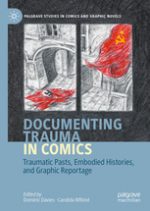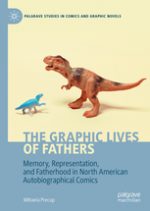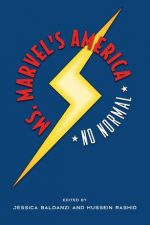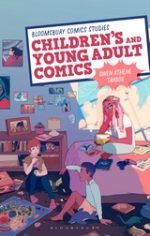CFP – The Vault of Culture
CFP – Innovative Modern Bodies
CFP – Berlin: Cityscapes and Urban Stories in Comics and Graphic Novels
Monitor 59: Neue Publikationen
Im Monitor werden in unregelmäßigen Abständen aktuelle Publikationen aus den letzten 6 Monaten vorgestellt, die für die Comicforschung relevant sein könnten. Die kurzen Ankündigungstexte dazu stammen von den jeweiligen Verlagsseiten. Haben Sie Anregungen oder Hinweise auf Neuerscheinungen, die übersehen worden sind und hier erwähnt werden sollten? Das Team freut sich über eine Mail an redaktion@comicgesellschaft.de.
→ Zu früheren Monitoren.
Monstrous Women in Comics
Horror and Monstrosity Studies Series
Samantha Langsdale, Elizabeth Rae Coody (Hgs.)
University Press of Mississippi
296 Seiten
April 2020
Verlagsseite
„Monsters seem to be everywhere these days, in popular shows on television, in award-winning novels, and again and again in Hollywood blockbusters. They are figures that lurk in the margins and so, by contrast, help to illuminate the center—the embodiment of abnormality that summons the definition of normalcy by virtue of everything they are not.
Samantha Langsdale and Elizabeth Rae Coody’s edited volume explores the coding of woman as monstrous and how the monster as dangerously evocative of women/femininity/the female is exacerbated by the intersection of gender with sexuality, race, nationality, and disability. To analyze monstrous women is not only to examine comics, but also to witness how those constructions correspond to women’s real material experiences.
Each section takes a critical look at the cultural context surrounding varied monstrous voices: embodiment, maternity, childhood, power, and performance. Featured are essays on such comics as Faith, Monstress, Bitch Planet, and Batgirl and such characters as Harley Quinn and Wonder Woman.
This volume probes into the patriarchal contexts wherein men are assumed to be representative of the normative, universal subject, such that women frequently become monsters.
Contributions by Novia Shih-Shan Chen, Elizabeth Rae Coody, Keri Crist-Wagner, Sara Durazo-DeMoss, Charlotte Johanne Fabricius, Ayanni C. Hanna, Christina M. Knopf, Tomoko Kuribayashi, Samantha Langsdale, Jeannie Ludlow, Marcela Murillo, Sho Ogawa, Pauline J. Reynolds, Stefanie Snider, J. Richard Stevens, Justin Wigard, Daniel F. Yezbick, and Jing Zhang.“
Documenting Trauma in Comics: Traumatic Pasts, Embodied Histories, and Graphic Reportage
Palgrave Studies in Comics and Graphic Novels
Dominic Davies, Candida Rifkind (Hgs.)
Palgrave
345 Seiten
Mai 2020
Verlagsseite
„Why are so many contemporary comics and graphic narratives written as memoirs or documentaries of traumatic events? Is there a specific relationship between the comics form and the documentation and reportage of trauma? How do the interpretive demands made on comics readers shape their relationships with traumatic events? And how does comics’ documentation of traumatic pasts operate across national borders and in different cultural, political, and politicised contexts?
The sixteen chapters and three comics included in Documenting Trauma in Comics set out to answer exactly these questions. Drawing on a range of historically and geographically expansive examples, the contributors bring their different perspectives to bear on the tangled and often fraught intersections between trauma studies, comics studies, and theories of documentary practices and processes. The result is a collection that shows how comics is not simply related to trauma, but a generative force that has become central to its remembrance, documentation, and study.“
The Graphic Lives of Fathers: Memory, Representation, and Fatherhood in North American Autobiographical Comics
Palgrave Studies in Comics and Graphic Novels
Mihaela Precup
Palgrave
244 Seiten
Februar 2020
Verlagsseite
„This book explores the representation of fatherhood in contemporary North American autobiographical comics that depict paternal conduct from the post-war period up to the present. It offers equal space to autobiographical comics penned by daughters who represent their fathers’ complicated and often disappointing behavior, and to works by male cartoonists who depict and usually celebrate their own experiences as fathers. This book asks questions about how the desire to forgive or be forgiven can compromise the authors’ ethics or dictate style, considers the ownership of life stories whose subjects cannot or do not agree to be represented, and investigates the pervasive and complicated effects of dominant masculinities. By close reading these cartoonists’ complex strategies of (self-)representation, this volume also places photography and archival work alongside the problematic legacy of self-deprecation carried on from underground comics, and shows how the vocabulary of graphic narration can work with other media and at the intersection of various genres and modes to produce a valuable scrutiny of contemporary norms of fatherhood.“
Apocalyptic Ecology in the Graphic Novel: Life and the Environment After Societal Collapse
Clint Jones
McFarland
189 Seiten
April 2020
Verlagsseite
„As awareness of climate change grows, so do the number of cultural depictions of environmental disaster. Graphic novels have reliably produced dramatizations of such disasters. Many use themes of dystopian hopefulness, or the enjoyment readers experience from seeing society prevail in times of apocalypse.
This book argues that these generally inspirational narratives contribute to a societal apathy for real-life environmental degradation.
By examining the narratives and art of the environmental apocalypse in contemporary graphic novels, the author stands against dystopian hope, arguing that the ways in which we experience depictions of apocalypse shape how we respond to real crises.“
Ms. Marvel’s America: No Normal
Jessica Baldanzi, Hussein Rashid (Hgs.)
University Press of Mississippi
280 Seiten
Februar 2020
Verlagsseite
„Mainstream superheroes are becoming more and more diverse, with new identities for Spider-Man, Captain America, Thor, and Iron Man. Though the Marvel-verse is becoming much more racially, ethnically, and gender diverse, many of these comics remain shy about religion.
The new Ms. Marvel, Kamala Khan, is a notable exception, not only because she is written and conceived by two women, Sana Amanat and G. Willow Wilson, but also because both of these women bring their own experiences as Muslim Americans to the character.
This distinct collection brings together scholars from a range of disciplines including literature, cultural studies, religious studies, pedagogy, and communications to engage with a single character, exploring Khan’s significance for a broad readership. While acknowledged as the first Muslim superhero to headline her own series, her character appears well developed and multifaceted in many other ways. She is the first character to take over an established superhero persona, Ms. Marvel, without a reboot of the series or death of the original character. The teenager is also a second-generation immigrant, born to parents who arrived in New Jersey from Pakistan.
With essays from and about diverse voices on an array of topics from fashion to immigration history to fandom, this volume includes an exclusive interview with Ms. Marvel author and cocreator G. Willow Wilson by gender studies scholar Shabana Mir.
Contributions by José Alaniz, Jessica Baldanzi, Eric Berlatsky, Peter E. Carlson, Sika A. Dagbovie-Mullins, Antero Garcia, Aaron Kashtan, Winona Landis, A. David Lewis, Martin Lund, Shabana Mir, Kristin M. Peterson, Nicholaus Pumphrey, Hussein Rashid, and J. Richard Stevens.“
Children’s and Young Adult Comics
Bloomsbury Comics Studies
Gwen Athene Tarbox
Bloomsbury
200 Seiten
April 2020
Verlagsseite
„A complete critical guide to the history, form and contexts of the genre, Children’s and Young Adult Comics helps readers explore how comics have engaged with one of their most crucial audiences.
In an accessible and easy-to-navigate format, the book covers such topics as
- The history of comics for children and young adults, from early cartoon strips to the rise of comics as mainstream children’s literature
- Cultural contexts – from the Comics Code Authority to graphic novel adaptations of popular children’s texts such as Neil Gaiman’s Coraline
- Key texts – from familiar favourites like Peanuts and Archie Comics to YA graphic novels such as Gene Luen Yang’s American Born Chinese and hybrid works including the Diary of a Wimpy Kid series
- Important theoretical and critical approaches to studying children’s and young adult comics
Children’s and Young Adult Comics includes a glossary of crucial critical terms and a lengthy resources section to help students and readers develop their understanding of these genres and pursue independent study.“
Roland Faelske-Preis 2020
Alle zwei Jahre vergibt die Arbeitsstelle für Graphische Literatur (ArGL) der Universität Hamburg zusammen mit der Roland Faelske-Stiftung den „Roland Faelske-Preis für Comic und Animationsfilm“.
Nun geht der Preis im Jahre 2020 in die nächste, die inzwischen sechste Runde – noch bis zum 01.07.2020 können Abschlussarbeiten und Dissertationen zur Begutachtung eingereicht werden.
Die Vergaberichtlinien, Teilnahmebedingungen, Gewinner der letzten Jahre und weitere Informationen finden sich auf der Webseite des Preises.
Online Workshop: „CorpoRealities“
Der vom 25. bis 27.06. ursprünglich als Präsenzveranstaltung geplante Workshop „ CorpoRealities: Perceptions of ‘Extraordinary’ Time in Literature and Comics“ findet nun im Online-Format statt. Der Workshop ist eine Gemeinschaftsveranstaltung der AG Comicforschung der GfM und des PathoGraphics Forschungsprojekts der Friedrich Schlegel Graduiertenschule für literaturwissenschaftliche Studien an der FU Berlin.
Veranstaltungstext:
„Literature and comics are each in their own specific ways ‘temporal arts’, unfolding sequences of action, collapsing or contrasting story time and discourse time, and representing temporal sequences in narrative or visual-spatial ways. Both media can deviate from chronological time and work with flashbacks and flashforwards, fragmentation, thus evoking, for instance, the layering of time and simultaneity. When representing experiences of ‘otherness’ due to illness and/or disability, perceptions of time that deviate from normal chronometry gain center stage: In the face of unexpected physical or psychic changes, subjective time may stretch or contract, bring one’s past and present into aggressive collision or cast a spotlight on mortality itself.
This workshop focuses on the ways in which literature and comics represent the specific sense of time that comes along with corporeal experiences. How do the two media show or tell such ‘extraordinary’ time and what are their aesthetic, individual and sociopolitical repercussions?“
Der Online Workshop wird über WebEx gestreamt und ist auch für Zuschauer geöffnet; hierfür wird um Registrierung an pathographics@fsgs.fu-berlin.de bis spätestens zum 15.06. gebeten.
Weiterführende Links:
Zur Veranstaltungswebsite.
Zum Programm.
Terminverschiebungen, Absagen und Alternativ-Veranstaltungen
Die Auswirkungen der aktuellen COVID-19-Pandemie sind auch im Kulturbetrieb sowie im Bildungs- und Forschungswesen stark sichbar. In diesem Thread versuchen wir, alle sich daraus ergebenden Terminverschiebungen, Absagen und Alternativ-Veranstaltungen im Bereich der Comicforschung für unsere Leser_innen zu sammeln. Ergänzungen können Sie uns gerne per Email an redaktion@comicgesellschaft.de schicken.
Lesen Sie zu unserer Redaktionsarbeit während der Pandemie auch diesen Post.
hinzugefügt am 08.06.2020:
- Die Jahrestagung der GfM (Gesellschaft für Medienwissenschaft), inklusive des in deren Rahmen stattfindende Panels der AG Comicforschung, findet vom 29.09. bis 02.10.2020 in virtueller Form statt. Die Deadline des CfP wurde auf den 26.06.2020 verschoben. Weitere Informationen auf der Veranstaltungswebsite.
hinzugefügt am 18.05.2020:
- Die Mitgliederversammlung der ComFor wird am 31.07.2020 im Online-Format stattfinden. Die Vorstandswahl erfolgt bis zum 15.07.2020 per Post. Weitere Informationen gehen den Mitgliedern über den vereinsinternen Verteiler per Email zu.
- Die 15. Jahrestagung der ComFor: Comics und Agency – Akteur*innen, Öffentlichkeiten, Partizipation findet vom 08.-10.10.2020 als Online-Veranstaltung statt. Die Deadline des CfP wurde auf den 15.06.2020 verschoben.
GINCO-Award 2020: Teilnahme bis zum 1. Juli
 Der GINCO-Award für Independent-Comics geht dieses Jahr in die zweite Runde. Nachdem im letzten Jahr bereits eine Vielzahl von Comickünstler_innen mit dem Preis ausgezeichnet wurde, ist es dieses Jahr noch bis zum 1. Juli möglich, Arbeiten einzureichen.
Der GINCO-Award für Independent-Comics geht dieses Jahr in die zweite Runde. Nachdem im letzten Jahr bereits eine Vielzahl von Comickünstler_innen mit dem Preis ausgezeichnet wurde, ist es dieses Jahr noch bis zum 1. Juli möglich, Arbeiten einzureichen.
Teilnahmebedingungen:
- Digitale Einreichung
- Indie-Künstler*innen
- Veröffentlichung zwischen 1.1.2019 und 31.12.2019 (bei Webcomics betreffender Abschnitt in dem Zeitraum)
- visuelle Erzählung (Comic, Bilderbuch, animierter Comic, Zine, etc.)
- gedruckt oder online veröffentlicht
- Indie- oder Self-Publishing, auch Projekte von Vereinen oder Netzwerken
- Sprache: Deutsch oder Englisch (bei anderen Sprachen mit entsprechender Übersetzung, z.B. per Untertitel)
- Datei muss RGB-formatiert sein (kein Druck-PDF)
Weitere Informationen sowie das Teilnahmeformular finden sich auf der Seite des Preises.
Mission Statement der Organisator_innen:
„Comics* gehören zu den zugänglichsten visuellen Medien überhaupt. Zu ihrer Produktion wird kein großes Kapital benötigt. Digitale Publikationswege stehen heute beinahe allen offen, als Einstieg, Ergänzung, oder gar Alternative zur Verlagspublikation.
Dadurch sind Comics im fortwährenden und dynamischen Wandel. Sie verschieben ästhetische und formale Grenzen, zwischen Texten und Bildern, zwischen Medien und Genres, zwischen dem Populären und dem Alternativen.
Unabhängige Zeichner*innen, Texter*innen und Nachwuchskünstler*innen finden so im Independent Bereich (Web/Eigenverlag/Kleinstverlag) viele Möglichkeiten, sich kreativ zu betätigen. Auf diese Weise bereichern Indie-Comics die deutsche Comiclandschaft um neue und diversere Geschichten, Themen und Perspektiven und halten sie so aktuell, relevant und nahbar.
Dafür verdienen diese Comicschaffenden Anerkennung und Unterstützung der gesamten Szene – finanziell, symbolisch, öffentlich. Der GINCO-Award möchte dazu beitragen und Indie-Comics inklusiv, transparent und öffentlichkeitswirksam würdigen, als Ergänzung und Erweiterung bestehender deutscher Comic-Auszeichnungen und -Strukturen.
Vor allem Künstler*innen aus marginalisierten Gruppen sehen wir als wichtige Zielgruppe an, da sie sich in etablierten Systemen oft nicht wiederfinden bzw. wenig Beachtung erlangen. Genauso soll die Arbeit unabhängiger und kleiner Verlage gewürdigt werden, da sie Marginalisierten oft als erstes Sprungbrett in die öffentliche Wahrnehmung dienen.
Die Organisation des GINCO-Award setzt auf flexible, unbürokratische Strukturen und wird sich und den Preis stets weiterentwickeln. Dies kann die Preiskategorien, die Jury, die Art des Preises oder den Ort der Preisverleihung betreffen.
Der GINCO-Award ist ein unabhängiger Preis, der durch einen non-profit Zusammenschluss unterschiedlicher Akteur*innen der Comic-Szene organisiert wird.“
Wir wünschen allen Teilnehmer_innen viel Erfolg!





